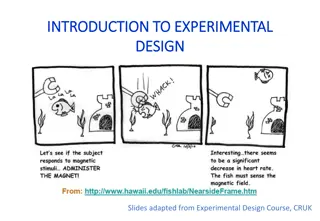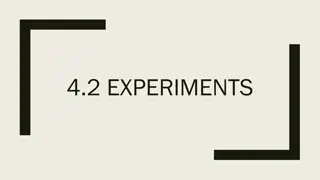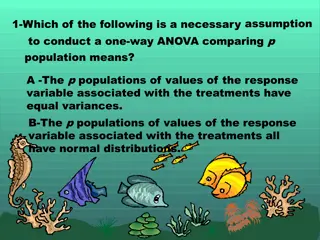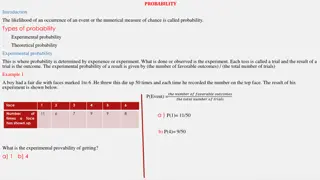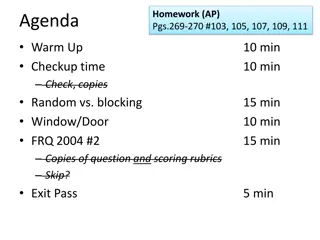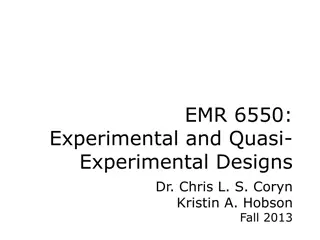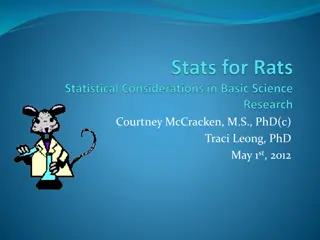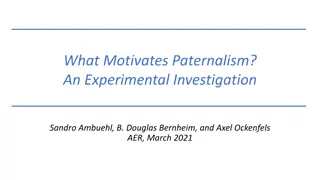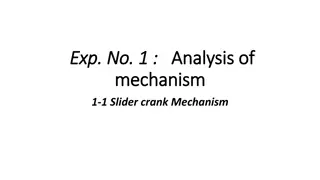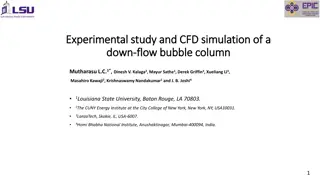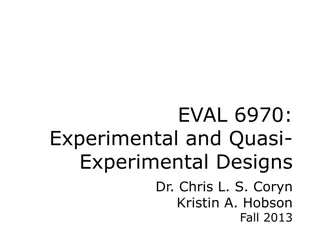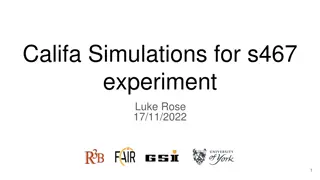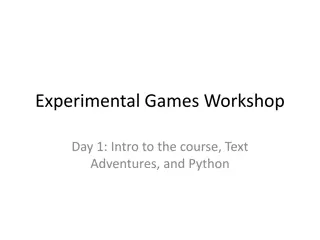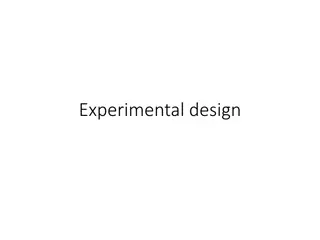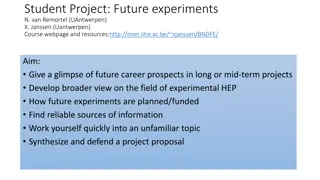Introduction to Experimental Economics by John Hey: A Comprehensive Overview
Explore the interconnected realms of Experimental Economics and Behavioral Economics through the insightful lectures of John Hey, an Emeritus Professor at the University of York. Discover the methodology of testing economic theories for validity and the practical applications of experimental economi
2 views • 58 slides
Insights on Experimental ASF Vaccines in Pig Studies
The research conducted by Prof. Jishu Shi and his team at Kansas State University delves into the safety and efficacy testing of experimental African Swine Fever (ASF) vaccines using pigs as the model. Various vaccines, including DNA vaccines and live attenuated viruses, were tested against differen
4 views • 13 slides
Experimental Design Principles
Explore the key elements of experimental design, from defining clear objectives to controlling for variation. Learn about the consequences of poor design and the importance of factors like replication and variables. Enhance your understanding of statistical analysis and the principles of a well-desi
0 views • 15 slides
Nonexperimental and Quasi-experimental Studies
Nonexperimental and quasi-experimental studies resemble experiments but lack random assignment, making them valuable for group comparisons without establishing causation. This type of research design looks at differences between groups that already exist, focusing on group differences rather than ca
2 views • 35 slides
Design of Experiment in Animal Genetics & Breeding: Principles and Methods
Biostatistics and computer applications play a key role in the design of experiments in animal genetics and breeding. Proper allotment of treatments to experimental units is crucial to study treatment effects accurately. Designing experiments helps in maximizing information from available resources,
0 views • 37 slides
Multiple Baseline Designs in Behavioral Experiments
Multiple Baseline Designs are a type of experimental design used in behavioral research. This design involves measuring two or more behaviors concurrently in a baseline condition, applying a treatment variable to one behavior at a time while maintaining baseline conditions for others, and then seque
1 views • 34 slides
Experiments in Research: Observation vs. Experimentation
Observation and experiments are two crucial methods in research. An observational study involves observing and measuring variables without influencing responses, while an experiment deliberately applies treatments to measure responses. Confounding variables can affect the results, and factors like e
1 views • 13 slides
Experimental Psychology: Designs and Control Issues in Research
This content delves into the basics of experimental research, focusing on different types of experimental designs and control issues. It covers between-group and within-group designs, discussing advantages and disadvantages, as well as methods for controlling for nonequivalence. The importance of ra
0 views • 26 slides
ANOVA in Experimental Design
In this educational content, we delve into the key concepts of ANOVA (Analysis of Variance) in experimental design. Topics covered include the necessary assumptions for conducting one-way ANOVA, the importance of testing factors in two-way ANOVA, various types of sum of squares, comparisons between
3 views • 15 slides
Software Engineering Design Principles and Concepts
The chapter discusses the essential principles and concepts in software design, highlighting the four key design models - data design, architectural design, interface design, and component-level design. It emphasizes the importance of traceability to the analysis model, minimizing the gap between so
2 views • 36 slides
Probability: Experimental and Theoretical Concepts
Probability is the measure of the likelihood of an event happening, with experimental and theoretical probability being key concepts. Experimental probability involves determining probabilities through experience or experiments, while theoretical probability can be calculated without prior experienc
2 views • 23 slides
AP Statistics Homework Agenda and Experimental Design Example
In this AP Statistics homework agenda, students work on warm-up questions, checkups, and a controlled experiment design example involving paper airplanes and natural light impact on test scores. The agenda covers various topics such as confounding variables, random vs. blocking, and controlled exper
0 views • 15 slides
Quiz Review on Scientific Method and Graphing
Explore a quiz review covering topics related to scientific method, graphing, and experimental design. Understand key concepts such as hypothesis, scientific law, theory, variables, and experimental control through detailed questions and images. Test your knowledge on laboratory safety, inferences,
0 views • 14 slides
Balanced Incomplete Block Design in Experimental Statistics
Balanced Incomplete Block Design (BIBD) is a crucial experimental design method where treatments exceed units per block. This approach helps efficiently analyze data by organizing treatments into blocks and replicates. In the provided example, Ford Falcon prices quoted by dealers to interviewers sho
0 views • 20 slides
Quantitative Research Designs in Nursing
Delve into the world of quantitative research in nursing, exploring different research designs and the concept of causality. Learn about experimental, quasi-experimental, and non-experimental designs, as well as the characteristics of experimental design like manipulation, control, and randomization
0 views • 22 slides
Quasi-Experimental and Interrupted Time-Series Designs Overview
Explore the various quasi-experimental designs, control groups, pretests, and outcome patterns in research methodologies. Understand the implications of different outcome patterns on causal interpretation and validity threats in experimental studies.
1 views • 31 slides
Experimental Design in Biology
Explore key concepts in experimental design in biology through clicker questions focusing on hypotheses, variables, control groups, and experimental groups. Learn how scientists test hypotheses and analyze results to draw valid conclusions in biological studies.
0 views • 15 slides
Compilation and Evaluation of Experimental Data for Nuclei in Z=2-28 Region
Completed compilation and evaluation of experimental Pn and half-lives for nuclei in the Z=2-28 region, led by Balraj Singh at McMaster University. The work involved preparing lists of neutron-rich nuclides, identifying potential emitters, analyzing available experimental data for 1n, 2n, 3n, and 4n
0 views • 20 slides
Biostatistics Core Principles in Experimental Design for Research Studies
Gain insights into the core principles of biostatistics for research studies, including experimental design, sample size considerations, and involving a biostatistician. Learn to formulate clear research questions, determine treatment groups, and address potential sources of variability in your stud
1 views • 52 slides
Advances in Ceramic Composite Property Modeling and Experimental Characterization
European research focuses on advanced modeling of C/C, C/SiC, and SiC/SiC composites for aerospace and nuclear applications, with an emphasis on correlating simulations with experimental validation. Laboratories are progressing towards a multiscale approach, integrating micro/nanomechanical characte
0 views • 5 slides
What Motivates Paternalism? An Experimental Investigation
Centuries of normative debate on paternalism have resulted in its ubiquity in various aspects of society, from consumer protection to safety regulations. However, there is a scarcity of empirical studies on the motivations behind paternalistic interventions. This experimental investigation delves in
0 views • 12 slides
Experimental Studies: Intervention, Characteristics, and Measurements
Experimental studies involve the investigator assigning exposures and following subjects to observe disease development. Different types of experimental studies exist, such as preventive and therapeutic types, each with its limitations, including ethical concerns and challenges in recruiting subject
0 views • 13 slides
Research Methods and Data Analysis
This review covers topics such as experimental classification, the comparison of non-experimental and experimental research, software features like JMP and SPSS, outlier handling in data analysis, and levels of measurement in statistical analysis.
1 views • 13 slides
Vietnam Neutrino School Overview
Vietnam School on Neutrino is an annual event started in 2017 to promote experimental neutrino physics in Vietnam. Led by Prof. Jean Tran Thanh Van, the school focuses on lectures, software and hardware training, group works, and excursions. With a mix of students from various countries, the aim is
0 views • 7 slides
Analysis of Slider-Crank Mechanism and Experimental Data
Slider-crank mechanism analysis involves understanding the transformation of input motion into desired output motion. This mechanism consists of a crank, coupler, slider, and ground link, converting circular motion into linear motion. Experimental procedures involve setting crank angles and recordin
0 views • 6 slides
Experimental Study and CFD Simulation of a Down-flow Bubble Column
This study and simulation focus on the experimental setup, measurement techniques, and results of a down-flow bubble column. It explores novel features such as inverted bubbly flow, micro-bubble generation, and gas injection. Detailed analysis includes axial and radial variations of volumetric gas h
1 views • 25 slides
Experimental and Quasi-Experimental Designs
Explore the foundations of experimental and quasi-experimental designs, delving into causal relationships, counterfactual reasoning, and the importance of validating statistical and internal conclusions. Learn about causes, effects, and the complexity of determining causation in research. Discover R
1 views • 46 slides
Probability: Learning Outcomes and Examples
This content delves into the study of probability, covering topics such as representing probabilities of simple and compound events, calculating relative frequencies, multi-step chance experiments, theoretical and experimental probabilities. It explains concepts like chance experiments, sample space
0 views • 31 slides
Experimental Studies in Epidemiology
Epidemiological studies and experimental studies play vital roles in understanding cause-and-effect relationships in research. Experimental studies involve manipulating independent variables and measuring dependent variables, with categories such as true experimental, quasi-experimental, and pre-exp
0 views • 22 slides
Califa Simulations and Experimental Observations in Nuclear Physics Research
Exploring nuclear physics research through Califa simulations and experimental observations with a focus on PID gating, clustering algorithms, beam settings, and Ca isotopes chain gating. The study involves simulating events on CH2 targets, analyzing clustering effects, and observing opening angles
0 views • 10 slides
FY25 LBS Lab OMEGA/OMEGA EP Proposed Campaign
Proposed campaign in FY25 by the LBS Lab to measure specific deliverables, compare results with experimental and theory PIs, collaborate with others, and assess technical issues such as target fabrication feasibility. The campaign involves motivation, relevant milestones, previous/simulated results,
0 views • 6 slides
Experimental Games Workshop: Intro to Text Adventures & Python
Welcome to the Experimental Games Workshop Day 1! Join us for an introductory course exploring Python for text adventure games and other exciting topics like game design, microcontrollers, and more. Collaborate with peers, engage in teamwork, and dive into experimental game development. Get ready fo
0 views • 19 slides
Non-Experimental Research Methods: Understanding Types & Techniques
Experimentation in research involves controlled settings and manipulation of variables to establish cause-and-effect relationships. On the other hand, non-experimental methods like observational studies, surveys, and archival research do not involve direct manipulation and control. This comparison e
0 views • 24 slides
Statistical Analysis of Data in Experimental Physics
Explore the fundamental principles of statistical analysis in experimental physics, covering topics such as measurement, model, random variables, sampling, errors, and regression analysis. Understand the importance of uncertainties, significant figures, and systematic errors in experimental data int
0 views • 34 slides
Understanding Different Types of Experimental Designs
Explore various experimental designs such as basic experiments, posttest-only design, pretest-posttest design, Solomon four-group design, and independent vs. repeated measures designs. Learn about the advantages, disadvantages, and potential confounding variables in independent groups design.
0 views • 19 slides
Characteristics of Experimental Studies: Manipulation, Control, Randomization
Understand the key elements of experimental studies, including manipulation, control, and randomization. Experimental designs are recognized as the gold standard for inferring causal relationships, making them crucial in research. Identifying if a study is experimental involves looking for specific
0 views • 34 slides
Future Career Prospects in Experimental High Energy Physics
Explore the future career prospects in experimental high energy physics, understand how future experiments are planned and funded, and find reliable sources of information to work on unfamiliar topics. Get insights on current big questions in the field, ongoing projects, group capacities, and adviso
0 views • 9 slides
Understanding Machine Design and Types: Introduction, Definition, and More
Explore the fundamentals of machine design, including its definition, purpose, and different types such as Adaptive Design, Development Design, and New Design. Learn about the design methods like Rational Design, Empirical Design, and Industrial Design. Enhance your knowledge on the concepts and pri
0 views • 11 slides
Experimental and Quasi-Experimental Designs Overview
Explore the concepts of experimental and quasi-experimental designs, including basic elements, measurement techniques, comparison groups, treatments, and notation. Learn about the limitations of designs lacking control groups or pretest observations, simple strategies for improvement, and why such d
0 views • 34 slides
Understanding Experimental Design Terms: CRD, Experimental Unit, Replicate, and Block
Explore the meanings of experimental design terms like CRD, experimental unit, replicate, and block. Learn how these terms are essential in statistical analysis and experimental research.
0 views • 12 slides


